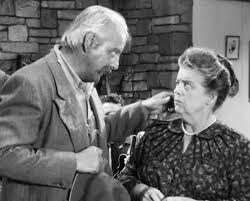
Aunt Bee Teaches Mr. Darling Some Proper Manners
Mayberry, North Carolina, was a town where the pace was slow, the greetings were warm, and the rules of social engagement were as deeply ingrained as the scent of honeysuckle in summer. In this gentle haven, manners weren't merely an affectation; they were the very fabric of community, a silent language spoken through polite nods, well-timed "please and thank yous," and the careful deployment of a napkin. Overseeing this delicate ecosystem, with the quiet authority of a benevolent monarch, was Aunt Bee Taylor.
Her domain, the sun-dappled kitchen and meticulously kept dining room of the Taylor residence, was the crucible where many a Mayberry soul, from wayward Opie to well-meaning Barney, had been subtly refined. But even in Mayberry, there existed corners untouched by its gentle polish, individuals whose lives unfolded to a different rhythm. One such was Mr. Darling, patriarch of the Darlings of Brushy Mountain, a man whose existence was as rugged and unvarnished as the mountain pines and whose social graces, like his banjo playing, were entirely self-taught and wholly unconcerned with convention.
It was an unusual circumstance that brought Mr. Darling to Aunt Bee’s table. Perhaps Andy had extended an invitation out of politeness after a particularly long day at the courthouse, or maybe Mr. Darling had simply found himself in town at suppertime, drawn by the tantalizing aroma wafting from the Taylor kitchen. Whatever the reason, the stage was set for a cultural exchange as profound as it was humorous, a gentle collision between two distinct worlds.
The initial moments at the dining table were a masterclass in silent commentary. Mr. Darling, accustomed to eating with the efficiency of a man who’d likely foraged for his own supper, eyed the array of silverware with suspicion. He’d already tucked a biscuit into his cheek and was reaching for the fried chicken with a directness that bypassed serving spoons entirely. Aunt Bee, ever the picture of composed grace, did not gasp or scold. Her method was far more subtle, more illustrative.
"Now, Mr. Darling," she began, her voice soft as a spring breeze but firm as the oak banister, "do try some of my green beans. They're fresh from the garden." As she spoke, she gently, almost imperceptibly, demonstrated the proper use of the serving spoon, scooping a delicate portion onto her plate. Mr. Darling watched, his eyes narrowed, before grudgingly, if clumsily, mimicking her action with a spoonful of beans. It was not a perfect execution, but it was a start.
The real challenge, however, came with the cutlery. Mr. Darling possessed a primal understanding of sustenance: food goes into the mouth. The intermediary tools were, to him, unnecessary impediments. He had already speared a piece of chicken with his bare fingers when Aunt Bee, with a patient smile, reached for her own fork. "This little fellow," she explained, lifting her fork with elegant precision, "is for the chicken. See how nicely it holds it?" She then cut a neat bite, chewed with her lips politely closed, and swallowed before offering a pleasant observation about the weather.
Mr. Darling grunted. He picked up his fork, treating it less like an eating utensil and more like a suspicious stick. He jabbed at the chicken, missed, then finally managed to impale a small piece, bringing it to his mouth with a look of intense concentration, as if disarming a tiny, edible bomb. His chewing, initially a robust, audible affair, softened ever so slightly under Aunt Bee’s unspoken gentle tutelage. Each time she ate, she was a quiet demonstration, a living lesson in the dance of knife, fork, and napkin.
But manners, Aunt Bee knew, extended beyond the mechanics of eating. They were the lubrication of social interaction. When Mr. Darling finished his first plate, pushing it forward with an abrupt scrape, Aunt Bee nodded warmly. "More chicken, Mr. Darling?" she inquired, and then, with a meaningful pause, added, "And perhaps a 'please' might help it along?" Mr. Darling blinked. He looked at Andy, then back at Aunt Bee, a flicker of bewildered understanding in his eyes. "Please," he mumbled, the word tasting unfamiliar on his tongue, "ma'am." Aunt Bee beamed, a quiet victory blooming in her gentle gaze.
The transformation was, of course, not overnight, nor was it complete. Mr. Darling would never be mistaken for a Mayberry townsman, let alone a debutante. But by the time dessert was served – a slice of Aunt Bee’s famed apple pie – a subtle shift had occurred. He still ate with an almost alarming speed, but he hesitated, just for a moment, before reaching, sometimes even employing his fork, albeit in an unorthodox grip. He even managed a gruff "thank ye" when offered more coffee.
Aunt Bee’s lesson to Mr. Darling was more than a mere instruction in etiquette. It was an illustrative testament to the Mayberry spirit itself: that every individual, no matter how wild or unpolished, possesses an innate dignity that deserves respect and gentle guidance, not judgment. She didn't seek to strip Mr. Darling of his identity, but rather to equip him with the tools to navigate a world beyond Brushy Mountain, to bridge the gap between his rugged independence and the quiet civility of community. In that sun-dappled dining room, with the scent of fried chicken and apple pie lingering in the air, Aunt Bee proved that true manners are not about rigid rules, but about the quiet grace of welcome, understanding, and the enduring power of a patient, illustrative hand.